How To Get Rid of Dandruff: Dermatologists Share the Best Treatments, Natural Remedies & Tips

If you purchase an independently reviewed product or service through a link on our website, SPY.com may receive an affiliate commission.
Table of Contents
If you’ve ever noticed the tell-tale white flakes on your back or shoulders (or, God forbid, someone else noticed them for you), then you’ve definitely wondered how to get rid of dandruff.
Today's Top Deals
But with so many dandruff shampoos and supposedly dandruff-fighting products out there, not to mention debatable “natural” home remedies, we understand why folks struggling with dandruff might not know where to begin.
To get the lowdown on dandruff, or seborrheic dermatitis, and some tips on how to get rid of it, we reached out to two of our go-to dermatologists for their advice: Dr. Corey L. Hartman, a board-certified dermatologist and the founder and medical director of Skin Wellness Dermatology in Birmingham, Alabama, and Dr. Michele Green, a board-certified cosmetic dermatologist who runs her own practice in New York City.
They walked us through the causes of dandruff, contributing factors and how to get rid of dandruff at home. As with anyway skin or hair problem, we always recommend checking in with your primary care physician or dermatologist, especially if over-the-counter treatments and dandruff products just aren’t cutting it.
Keep scrolling for our experts’ advice on how to get rid of dandruff, and the products you’ll need to fight flakes.
How Common Is Dandruff? What Causes It?
First, everybody has a little bit of scalp flaking, but for the majority of people, it never reaches a point of concern where it will be felt or seen. The difference has to do with Malassezia, a common yeast, that exists on your scalp as a natural part of hair follicles, according to Hartman. When that fungus migrates to your scalp or overgrows, it can feed on your scalp’s oils and cause skin irritation, which can lead to dandruff, exacerbate existing scalp conditions or develop into something closer to scalp psoriasis.
It can also crop up from excess oil, which feeds the Malassezia, a dry scalp, especially during colder seasons, and poor hygiene, said Green. Though over-the-counter dandruff treatments will be able to clear up dandruff, for most people no matter the cause, here’s how you can tell the difference between dry and oily dandruff: “Red, oily, and scaly skin, an itchy scalp, and large, oily flakes that are yellow or white in color are characteristic of oily dandruff. Having dry dandruff is indicated by the presence of small, dry flakes and is usually accompanied by dry skin on other areas of the body,” Green said.
So to get rid of your dandruff at the source, you can fight the fungus, you can fight the excess oil that serves as its fuel and you can moisturize your scalp when dealing with drier skin.
Dandruff-Fighting Ingredients You Need To Know
Learning how to get rid of dandruff requires a familiarity with the ingredients used in common over-the-counter dandruff products. Despite the gazillion anti-dandruff products out there, the vast majority are just different formulas using the same active ingredients. Two ingredients you definitely want to be on the lookout for are pyrithione zinc and selenium sulfide, Hartman said.
Green also mentioned pyrithione zinc, saying, “For most cases of dandruff, whether due to a dry or an oily scalp, an over-the-counter shampoo containing the ingredient pyrithione zinc should suffice for eliminating symptoms and providing relief to an itchy, flaky, irritated scalp.”
Beyond those two, both dermatologists also mentioned ketoconazole, an antifungal, as an ingredient that can help fight Malassezia at the source. For those who’ve struggled with acne, you’ll be familiar with another helpful ingredient, salicylic acid. Many shampoos use salicylic acid to break down dry scalp buildup and clear away oils, which can be hugely beneficial against dandruff. “The salicylic acid helps to clear the scalp of any buildup that might encourage yeast to grow and essentially exfoliate the scalp to keep it clean and flake-free,” Green said.
Finally, there’s coal tar, which may help slow the flaking process, according to the Mayo Clinic.
What are the best natural dandruff treatments? In addition to the dandruff treatments described above, some SPY writers and editors have found success fighting dandruff with natural shampoos that contain tea tree oil or apple cider vinegar, both of which have natural anti-fungal properties. We asked both dermatologists about these natural dandruff treatments, and we’ve included more of their thoughts below. Anecdotally, we have had success using them on our own scalps. In our experience, these types of natural dandruff shampoo work best at preventing dandruff rather than clearing up acute outbreaks of flakes.
Now that we’ve got all the basics covered, let’s find out how to get rid of that dandruff. Check out our top dandruff shampoos below and other steps you can take to minimize your dandruff. We based our picks on reviews, our own experience and, of course, the advice of the experts.
The Best Dandruff Shampoos
Harry’s Dandruff Shampoo and Scalp Scrub
Did you know that some of the best dandruff treatments come from a shaving club? Harry’s introduced dandruff treatments in 2020, and they’ve become our favorite dandruff products. We named their 2-in-1 Dandruff Shampoo & Conditioner the Best Dandruff Shampoo in The 2021 Man, our men’s product awards. The shampoo contains pyrithione zinc and other soothing ingredients. In addition, their sugar scalp scrub scrapes away flakes and leaves your scalp tingly fresh.
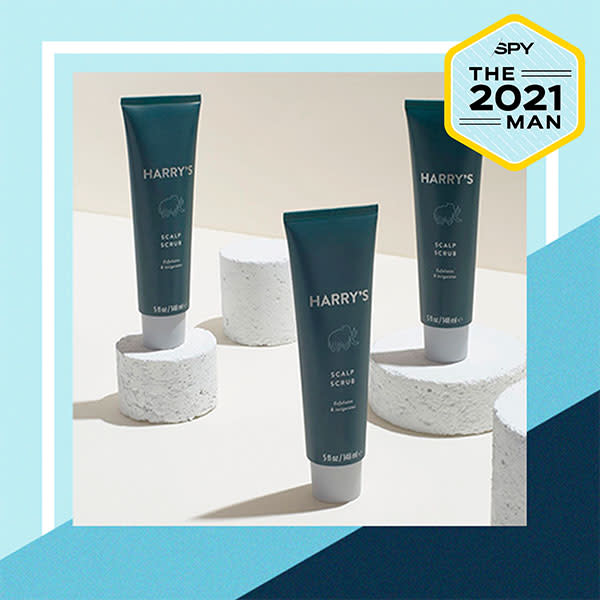
Buy: Harry’s 2-in-1 Dandruff Shampoo and Conditioner $7.00
Buy: Harry’s Scalp Scrub $9.00
2. Head and Shoulders Anti-Dandruff Shampoo and Conditioner
BUDGET PICK
If you know next to nothing about dandruff, you still have probably picked up on the fact that Head and Shoulders is one of the leading brands. Both Green and Hartman mentioned it as a great starting point and we know firsthand they’re right. In particular, the Head and Shoulders Classic Clean Anti-Dandruff Shampoo and Conditioner works well to control dandruff for so many people, thanks to its pyrithione zinc. Plus, it’ll leave your hair feeling clean and soft, too.
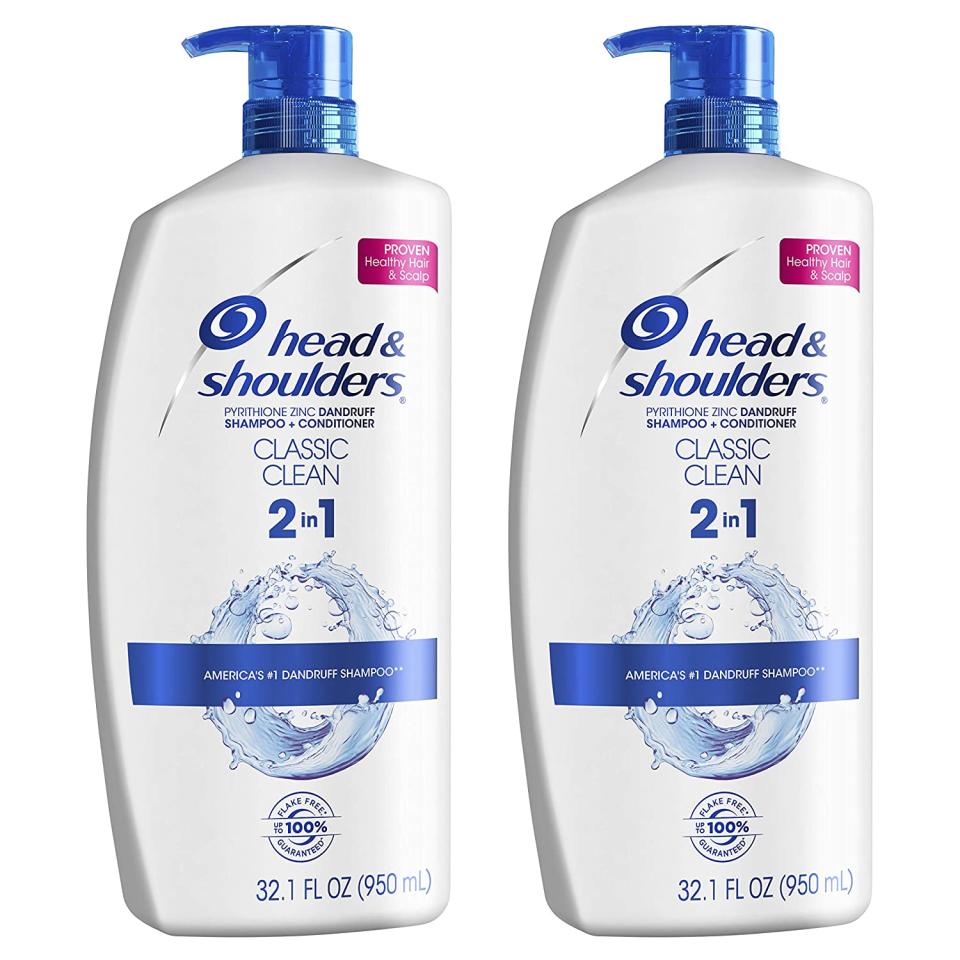
3. Selsun Blue Medicated Maximum Strength Dandruff Shampoo
EXTRA-STRENGTH
Selsun Blue Medicated Maximum Strength Dandruff Shampoo goes the selenium sulfide route to treat dandruff and it’s even more effective than Head and Shoulders, according to one clinical study from the National Institutes of Health. If you try Head and Shoulders and don’t like it for any reason, Selsun Blue will be your next best bet to get rid of dandruff.
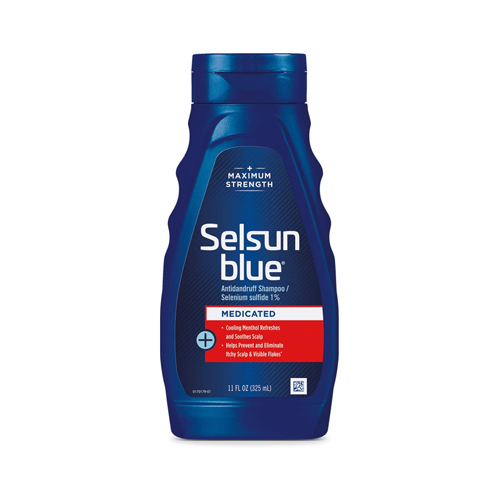
Buy: Selsun Blue Medicated Maximum Strength Dandruff Shampoo $6.98 (orig. $9.09) 23% OFF
4. Neutrogena T/Sal Therapeutic Shampoo Scalp Build-Up Control
TARGETED TREATMENT
For a salicylic acid-based shampoo, go for the Neutrogena T/Sal Therapeutic Shampoo Scalp Build-Up Control. It brings the same oil-fighting power you expect from Neutrogena’s skincare products to your scalp and promises to minimize the symptoms of dandruff and scalp psoriasis by clearing away excess oil and breaking down skin build-up.
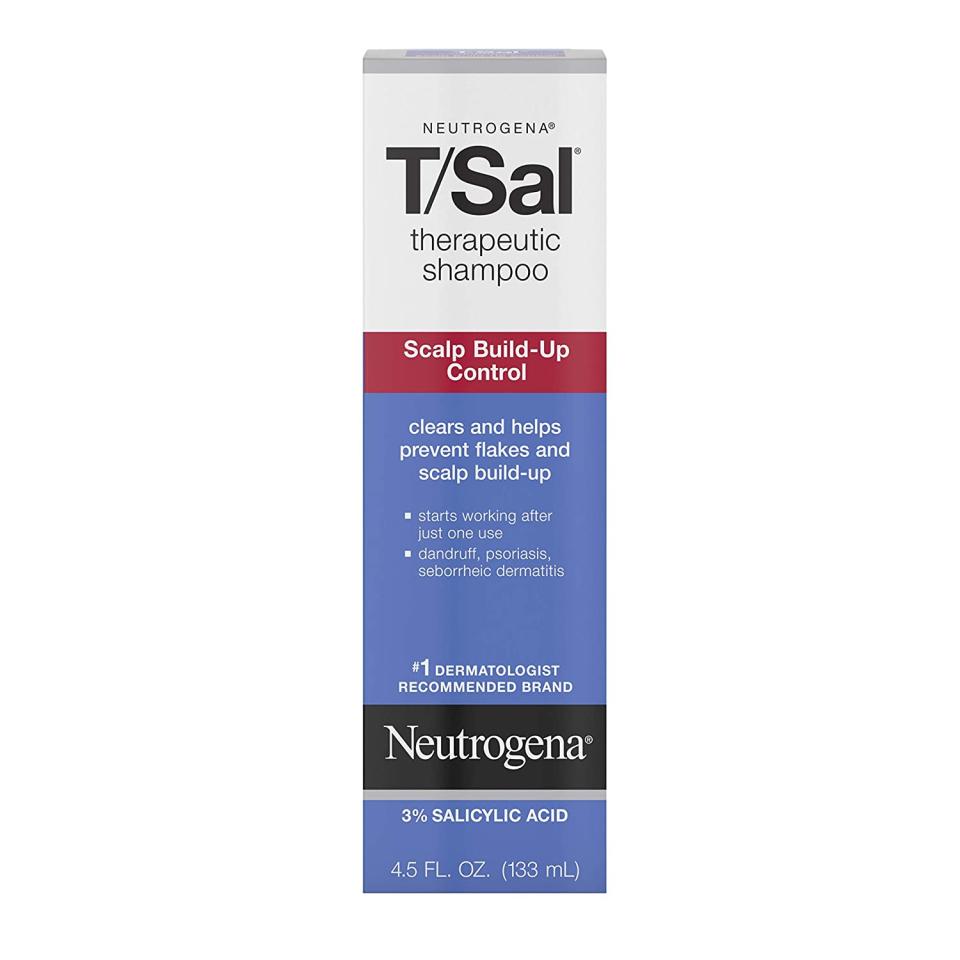
Buy: Neutrogena T/Sal Therapeutic Shampoo Scalp Build-Up Control $16.49
5. Tea Tree Special Shampoo
NATURAL PICK
When learning how to get rid of dandruff, experts will tell you to stick with ingredients that contain pyrithione zinc. However, if you’re looking for a more natural solution, then you can try tea tree oil products, which have natural anti-fungal properties. This is our favorite tea tree shampoo, and it’s often on sale via Amazon Prime if you want to try it out.
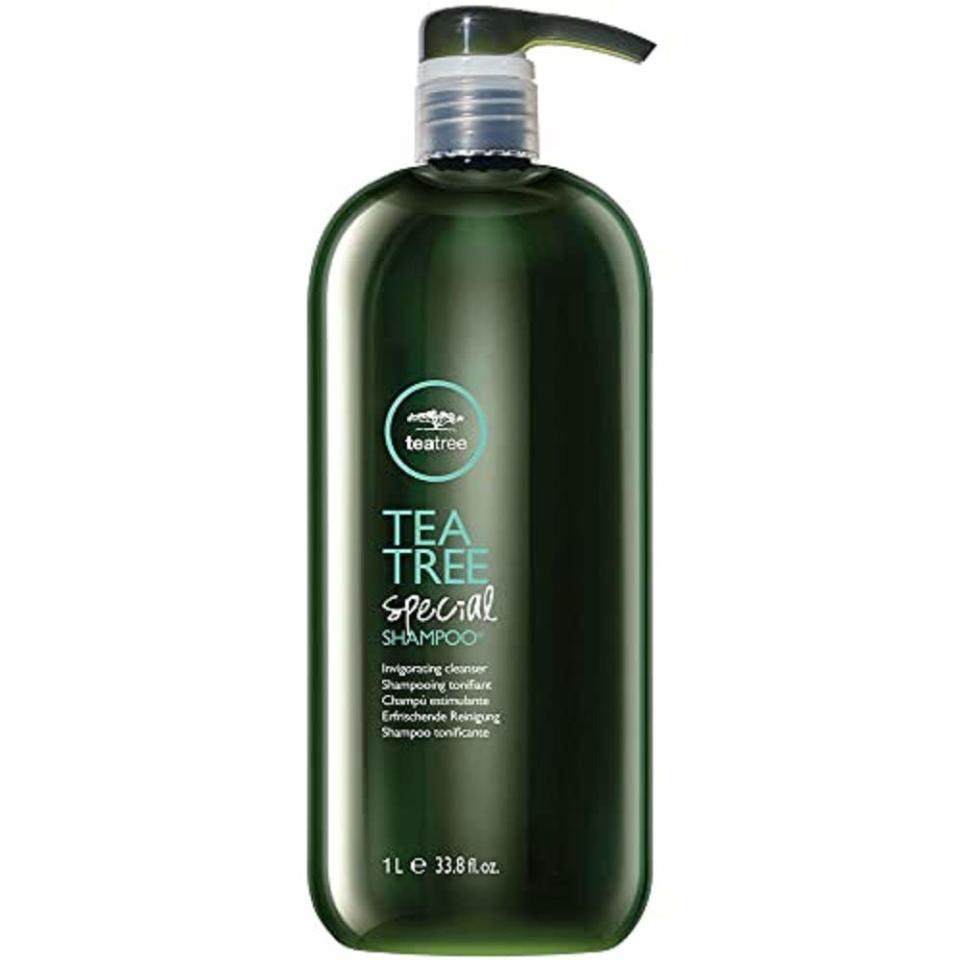
Buy: Tea Tree Special Shampoo $12.75 (orig. $16.50) 23% OFF
DIY Dandruff Treatments
1. Home remedies and alternate treatments
Though we’d recommend sticking to over-the-counter products designed to treat dandruff, many of which are clinically proven and backed by some hard science, there are home remedies to turn to if need be.
For instance, adding the right oils to your scalp care regimen could help, but adding the wrong oils could make dandruff even worse by feeding the yeast. You can probably guess one popular option: tea tree oil. Tea tree oil has natural antifungal and antibacterial properties, which help it tamp down on yeast. “Tea tree oil has the power to kill yeast and in turn limit the dandruff caused by yeast overgrowth. Additionally, tea tree oil is anti-inflammatory, meaning it can potentially help to soothe an irritated and itchy scalp suffering from dandruff,” Green said. For his part, Hartman advised against adding oils to your hair, arguing that the yeast is the root of the problem, so oils will only make it worse.
Aside from oils, there are even some products you likely already have at home that can help fight dandruff, such as vinegar, baking soda and aloe vera. “These home remedies for dandruff have naturally antimicrobial and anti-inflammatory properties that can reduce the bacteria and fungi that may be contributing to the presence of dandruff on the scalp,” Green said. Just make sure to massage these into your scalp before washing with shampoo and conditioner in the shower, Green added.
If you’re open-minded to other over-the-counter products that can help, Hartman also mentioned other fungus-fighting products like athlete’s foot cream as well as other scalp treatments like Scalpicin, which uses hydrocortisone to treat dandruff, eczema and psoriasis. Though the former isn’t designed for scalps, it uses antifungal ingredients that can tamp down on yeast-causing dandruff.
2. Lifestyle changes
Outside of the realm of products, lifestyle factors can also contribute to dandruff. For one thing, stress affects overall health. “Feelings of stress have been linked to hormones that play a role in controlling sebum production, and high stress levels have been connected to the overproduction of sebum. Excess sebum and oil on the hair and scalp can cause dandruff,” Green said. “Stress also happens to weaken the immune system, creating an environment for overgrowth of the fungus Malassezia, another factor that leads to dandruff. Reducing stress can be an effective way for many individuals to help manage dandruff.”
Another thing you’re doing that might be affecting your dandruff: Exercising. Though the health pros of exercising far outweigh any dandruff-related cons, exercise creates sweat, leading to an oilier and more moist scalp “where bacteria and fungus that cause dandruff can thrive,” Green said. Furthermore, if not washed out, the salts from sweat can prompt the scalp to overproduce oil to compensate, which could make dandruff worse.
Even something as straightforward as how you shower can contribute to dandruff. The effects of hot vs. cold water or how often you shower aren’t an exact science, of course, because different scalp conditions will lead to different outcomes. But you can monitor and change up your showering habits to see if they affect your dandruff.
3. Talk to a professional
The bottom line: Dandruff is a dermatologist’s bread and butter, so if you can’t seem to get the edge against excessive irritation and flakes, a dermatologist can help you get to the bottom of the issue and determine the best way to move forward.
More Top Deals from SPY
Best of SPY